- Home
- Anne Bennett
A Little Learning Page 2
A Little Learning Read online
Page 2
Sarah McClusky had no wish to see another of her children exposed to danger, but she knew it was Betty’s way of dealing with her brother’s death. She took a deep breath to steady her own fear and said firmly, ‘The weans will be as right as rain with us. Dad has the shelter that cosy, with bunks fixed to the sides and the oil heater to take the chill off, and they’ll be as safe as houses.’
Betty was grateful, for she knew what it had cost her mother to react the way she did. The following day she joined up as an ARP warden.
It soon became apparent that Birmingham was ill equipped to deal with the casualties of the bombing raids, which were intensifying throughout the city. The job of the wardens included trying to arrange temporary accommodation of some sort for the homeless, plus clothes, bedding and food.
People taking shelter where they could often did not get any aid for hours, and there were some disorderly scenes among the desperate and often destitute people. In an effort to help the situation, mobile canteens were set up, and Betty elected to serve in one of these, together with her fellow ARP warden and friend Cynthia, who was the driver.
On the night of 19 November 1940, the sirens had not even died away when the first thuds were heard. Sarah McClusky felt her stomach tighten in fear as she watched her daughter struggle into her coat. She knew Betty had to go, and hoped the raid would be over soon, but she had to look after Duncan and Janet, so she began hurriedly to pack a bag to take down to the shelter. ‘Take care, lass,’ she said to Betty as she was about to leave.
‘I will, Mammy,’ Betty said. There was a sudden explosion very close and she went on quickly, ‘Don’t worry about me, Mammy, I’ll be fine, but get the children and yourselves down to the shelter quick.’ She gave her mother and children a kiss. ‘See you in the morning.’
It was a long raid and a bad one. The ack-ack guns were at work as she made her way to the ARP post in Erdington, and the searchlights were raking the skies. She sent up a prayer that her family would be safe when she returned – the children, her parents and Breda on her night shift.
Hours later, as the mobile canteen drove towards Birmingham city centre, which seemed to be ablaze, Cynthia was cut badly about the face by shards of glass from the windscreen, which had been shattered by a bomb blast. One of the ambulancemen who took the unconscious and bleeding Cynthia to hospital turned to Betty and said, ‘Have to leave the van where it is, love, and hope it isn’t blown to kingdom come.’
Until then, Betty had given no thought to the van, but she knew they were needed – indeed, they were a lifeline for many families, and for the rescue workers digging people out, often near dead on their feet with exhaustion themselves.
‘No bloody Hitler’s getting my van,’ she said, climbing into Cynthia’s seat. She didn’t know how to drive, but she’d seen Cynthia do it often enough. She turned the key and the throbbing engine came to life. Slowly and carefully she put it into gear and touched her foot on the accelerator. She was slow and a bit jerky, but she was driving, and a thrill of exhilaration ran through her. She negotiated potholes and piles of debris blown into the road by the falling bombs. The wind buffeted her through the gaping hole in the windscreen, and all around her was constant noise.
Black arrows of death were tumbling from the droning planes above, the never-ending rattle of the guns seeming to make no impression on them. She heard cries and terrified screams, and saw walls crumple with shuddering thuds before her eyes, exploding in clouds of dust. The sirens of fire engines and ambulances screamed through the night. She saw the city skyline lit up with a strange orange glow, and the acrid smell of smoke was in her mouth and nose.
And she drove through it all, like a scythe cutting a swath through corn, too excited to be scared. A little while later, she was dishing out tea and sandwiches to people in an emergency rescue centre, and being described as ‘an angel’.
She told no one about her driving. She told her mother as little as possible anyway. Sarah McClusky understood Betty’s need to be doing something and looked after Duncan and Janet with no complaint. However, if she’d had her way, she’d have had her Betty tucked up in the shelter with the children.
Sarah was confused by the way of the world. By working her fingers to the bone, she’d been able to put shoes on her children’s feet and food in their stomachs when times were bad. She’d kept them safe and healthy, she’d nursed them through childish ailments, they were well nourished enough to fight. She was proud of her fine family. But she’d already lost one son to the war, with the other two risking their lives daily, and a daughter to the munitions, for she knew that Breda – never as easy or compliant as her sister – would go her own way after this.
Then there was Betty. With her husband away fighting, she doled out nourishment, hope and sympathy to the homeless and rescuers alike in the city centre where the raids were heaviest. Betty told her mother that they took shelter when the raids were bad, but Sarah wasn’t sure she’d been telling the truth. She had the idea she wasn’t told about a lot of things.
‘You dark horse,’ Cynthia said when Betty visited her in the General Hospital later. She was swathed in bandages and looked a little pale, but she smiled bravely as she asked: ‘Why did you never say you could drive before?’
‘Oh, you know,’ Betty said, busying herself with an imaginary stain on her skirt so that Cynthia wouldn’t see the telltale flush flooding her face. ‘It’s a long time ago. I wasn’t sure I still had the knack.’
‘I think it’s like riding a bike,’ Cynthia said. ‘You know, you never really forget.’
‘Yes,’ said Betty, anxious to get off the subject. She looked out of the window at the steel-grey skies and the people hurrying below huddled in thick coats, scarves and hats. ‘It’s bitter out there, Cynth, you’re in the best place for the moment.’
‘Don’t you believe it,’ Cynthia said. ‘D’you know what they do when there’s a raid? They stick us underneath the beds. Some chance if the hospital gets a direct hit, eh? I’d descend to the ground floor mighty quick, if you ask me, under tons of masonry, crushed flat by my own iron bed. No, I’d rather take my chance out on the street, where you can see the buggers coming.’
‘Oh, Cynthia,’ Betty said with a chuckle, ‘I’ve missed you.’
‘Well, you’ll have to go on missing me,’ Cynthia said, ‘because even when I’m out of here, you’ll probably get a different crew now. I don’t think they’ve got enough drivers to put two together.’
‘Oh, no … I mean, yes … of course, you’re right.’ That hadn’t occurred to Betty, but she enjoyed driving so much, she didn’t want to give it up. She kept the truth from her mother and her husband who might have spilled the beans that she’d never had a driving lesson in the whole of her life. No one asked, and as drivers were in short supply, she was in great demand.
The war went on relentlessly. The raids eased a little, but the battle for the housewife was coping with shortages and rationing. Making do and mending was all very well, Betty thought wryly, if you had something to make do with in the first place.
Then, just before the spring of 1944, Bert came home for pre-embarkation leave.
‘I think this is it, my old duck,’ he told Betty, ‘the big push, the beginning of the end, old girl.’
And what if, when the end finally comes, I have no husband? thought Betty, and she cried into Bert’s shoulder and wouldn’t tell him why. The ARP post had to do without her for two nights while she lay in Bert’s arms, and their lovemaking was frantic as they realised that their time together was short. By the time Bert was treading the beaches of Normandy, Betty was getting used to the idea of another little Travers to join Duncan and Janet. She cut down on her war work as her pregnancy advanced, and gave it up entirely just before Christmas of that year.
The second telegram arrived the day the Christmas cards were due to come down. Sarah opened it with trembling fingers, and when she read that Conner, her eldest son, was to lie beside his brother in foreign
soil, she fell down in a faint. Sean McClusky envied his wife her unconsciousness, and wished he didn’t have to deal with the knowledge that two of his children were dead and gone. He put his head in his hands and wept.
Betty’s grief was deep and profound for the big brother she’d always looked up to. Noel’s death had acted as a catalyst, urging her to take a more active part in the war that had stolen her brother. This time there was nothing she could do to lessen the hurt, for hostilities were nearly at an end and the tide of war was turning.
However, she wasn’t allowed to grieve for long, for just days after they received the news about Conner, her pains began. Her labour was long and difficult and the midwife sent for the doctor. He was mystified as to why Betty should be having such a difficult time, until it was established that there were two babies, not one as originally thought. Betty couldn’t believe her ears and redoubled her efforts, and on a raw January day gave birth to twin boys, both healthy, lusty and a good size.
When Sarah McClusky was told the news she dropped to her knees. ‘The Lord giveth and the Lord taketh away,’ she said. Betty agreed with her mother’s sentiments, and the two boys were christened Conner and Noel. Sarah often looked for signs of her dead sons in the twins.
‘I think Conner has his uncle’s nose,’ she’d say, or ‘Noel is the image of his namesake. Even their eyes are the same shape.’
Betty didn’t agree because in her opinion both boys looked like Bert. In their identical faces she could see Bert’s hazel eyes, and his large nose. Even the shape of their faces was the same – round, with ruddy cheeks – and eventually, Betty guessed, their chins would turn craggy like Bert’s. Only their wide mouths and the colour of their hair was the same as hers and Janet’s. It was Duncan who resembled his dead uncles, in both colouring and build.
‘Ma can’t see it,’ Betty said to Breda. ‘Duncan is the spit of our Noel at the same age. I remember him well. I can’t remember Conner as a child, because he was older than me, but I’ve seen photographs.’
‘She doesn’t want to see it,’ Breda said. ‘Not in Duncan. She wants the twins to look like their dead uncles because in her mind they’ve replaced them.’ She struggled and went on, ‘It helps her cope.’ Betty said she supposed it did, she had neither the time nor the inclination to argue further; she was too busy dealing with the family to do any further war work, and she was just glad that things were winding down at last.
The VE celebrations and street parties were tinged with sadness for many who had loved ones not returning after the war. Betty and her parents felt sad that Conner and Noel had not lived to celebrate the day, but the twins’ birth helped them all to cope. Betty knew she had much to be thankful for. Her husband and one brother were safe, and her sister, and she had her fine family, Duncan, Janet and the twins.
She was immersed in domesticity now, but busy as she was, she often found the days tedious. Driving around the ravaged city dealing with the destitute and the desperate had seemed important work. She had dealt with the bereaved and the sick and those in shock, and had felt useful and needed. It wasn’t that she didn’t consider her family important; it was the boredom of doing the same thing day after day she found hard to take. She also seemed to lack any identity now – just wife and mother, where once she’d been someone in her own right.
She knew that when Bert returned she would tell him little of the work she’d done in the war. He’d never have recognised the organised person driving the mobile canteen through the streets of Birmingham as his Betty anyway. Betty herself found it hard to remember what she’d been like then, and now the family claimed all her attention.
Duncan could have taken the eleven-plus that year, but he didn’t want to and the teachers told Betty there was little point.
‘An apprenticeship would be ideal, Mrs Travers,’ the headmaster said. ‘Or something in that line. He’s not a stupid boy and he’s good with his hands, but not grammar school potential. Now if it were Janet …’
The words were left hanging in the air. Betty pondered on them, but said nothing to anyone.
Duncan didn’t care. ‘I don’t want to go to no soppy grammar school, Ma. I want to go to Paget Road Secondary with my mates.’
Janet had wished she’d had the opportunity to sit the exam, and wondered if she’d ever be allowed to. She knew Duncan didn’t want to go to grammar school, he’d told her often enough. He disliked school and thought it a waste of time, but realised he had to be there for a while and went without too much fuss. He was determined to leave at the first opportunity.
‘But what will you do?’ Janet asked.
‘I reckon our dad can get me set on at Fishers with him.’
‘Is that what you want?’ Janet persisted. ‘Make car bodies all day?’
Duncan stared at her. He’d never considered what he actually wanted to do. You went to school, left, got a job and had money in your pocket to spend. That was life.
‘Course it’s what I want,’ he snapped. ‘It’s what everyone wants, ain’t it?’
Janet didn’t answer. It wasn’t what she wanted, but it wouldn’t help to say so.
Bert was delighted with Duncan’s decision. ‘Chip off the old block, eh, son?’ he said, clapping him on the shoulder. He had a vision of him and his son in a few years’ time, walking side by side through the factory gates.
Betty was glad that Bert was pleased, because she knew the war had robbed him of his youth. The man who returned to her had grey streaks in his dark hair, and Betty noticed that he was going thin on top. She said nothing, just being glad he’d returned safely. She didn’t comment either on the haunted look that was often in Bert’s eyes as he seemed to stare vacantly into space, or the times he cried out in his sleep. She could only imagine the horrors he’d witnessed in the war and doubted that many of the returning heroes were untouched by their experiences.
Bert had also begun to get interested in politics again, as he had before he’d joined up. The first election of peacetime was held on 5 July 1945, but as most of the armed forces had not demobbed by then, the result could not be calculated until 26 July when all the postal votes were in and counted.
Bert was home in time to hear that Labour had been elected to government by a resounding majority, and he was cock-a-hoop with excitement. ‘This will make a difference, you’ll see,’ he said to Betty. ‘Transport and some industries will be nationalised, so the State will own them and everyone will benefit.’
‘You mean like with communism?’
‘Communism be damned, woman, this is socialism I’m talking about,’ Bert said furiously. ‘And that’s not all. They’ve committed to taking on the Beveridge Report; that means family allowances and setting up a health service at the very least.’
‘Well you seem pleased, at any rate,’ Betty said. ‘And if I get family allowances to help feed and clothe the children and don’t have to pay every time I go to the doctor’s I’ll be thankful enough.’
Bert went one step further and without further delay he joined the Labour Party, and went on to run for shop steward in Fisher and Ludlow’s factory where he made car bodies. All in all, Bert was well satisfied with his life and relieved that none of his family had been hurt in the war. And though he was sorry about his brothers-in-law Noel and Conner, he couldn’t help feeling pleased that his wife and children were safe, and a credit to Betty who’d had most of the rearing of them while he’d been away.
Bert found little to say to his quiet, studious daughter, but he was bowled over by the twins, who looked so like him, and whose early months he’d missed. They were turned six months now, and they chuckled as Bert tossed them in the air and put them astride his bouncing foot to play ‘horsy’.
He was less pleased with the job Betty had got, doing the evening shift at the sauce factory with her sister. Breda had had a good war. Despite rationing and restrictions, she had a wardrobe bursting with clothes, money in the bank and many memories, some happy, some sad. For a time it had
seemed she might marry a GI and go to live in the States after the war. Mr and Mrs McClusky, in an agony of worry, had appealed to Betty, who tackled her sister.
‘I’m having a good time, that’s all,’ Breda had snapped. ‘I’m not looking for a husband. Rick’s never mentioned marriage, and even if he did it’s not a foregone conclusion I’d take him on.’
It was hardly satisfactory, but it had to do. Betty told her parents that Breda and her Yank were just good friends. Then there were the two dashing airmen who were both killed in action. Breda had arrived at Betty’s home in tears after she’d heard about the second one.
‘You see,’ she’d wept, ‘how can we talk about the future with this godawful war? Who’s going to be left alive at the end of it all?’
Betty had hugged her, rocking her almost without being aware of it. She knew what Breda meant. Each evening when she reported for duty, she viewed the desolation around her and was amazed that anyone could still be alive, or that people struggled to gain some sort of normality in it.
‘I know, love,’ she told Breda. ‘All we can do is keep going.’
There were no attachments for Breda after that. Though she went out with many men, she never kept them for long, and never allowed herself to get involved. Betty was concerned that she might make a name for herself, but said nothing and kept her worries to herself.
Then, at the end of the war, Breda had taken up with Peter Bradshaw, a lad she’d gone out with a few times before war broke out and who now returned, one of the conquering heroes.
‘Do you love him, Breda?’ Betty asked.
‘I’m marrying him,’ Breda said, and added, ‘What’s love anyway, Bet? I’ve loved and lost enough in the last few years to last a lifetime, and I suppose me and Pete will rub along well enough.’
The munitions factory was closed and the staff dispersed, and Breda lost no time in getting herself a job in the HP Sauce factory, which was taking on a twilight shift.

 As Time Goes By
As Time Goes By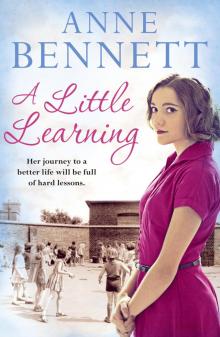 A Little Learning
A Little Learning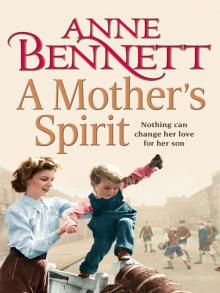 A Mother's Spirit
A Mother's Spirit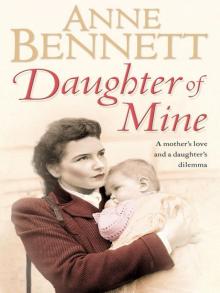 Daughter of Mine
Daughter of Mine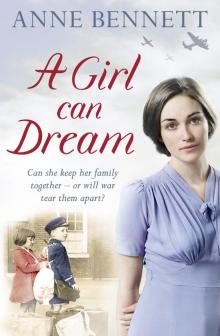 A Girl Can Dream
A Girl Can Dream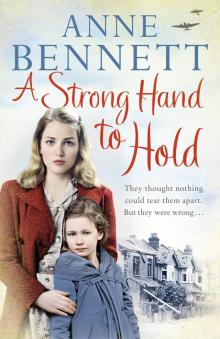 A Strong Hand to Hold
A Strong Hand to Hold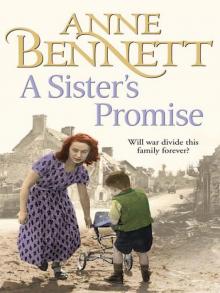 A Sister's Promise
A Sister's Promise To Have and to Hold
To Have and to Hold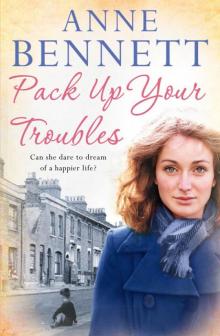 Pack Up Your Troubles
Pack Up Your Troubles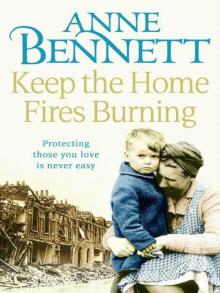 Keep the Home Fires Burning
Keep the Home Fires Burning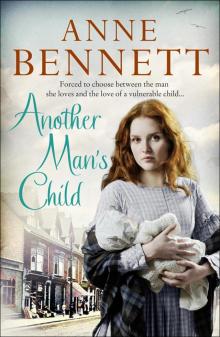 Another Man's Child
Another Man's Child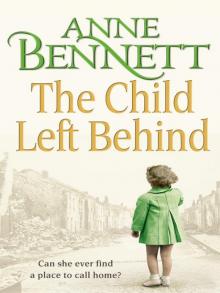 The Child Left Behind
The Child Left Behind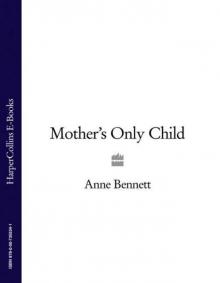 Mother’s Only Child
Mother’s Only Child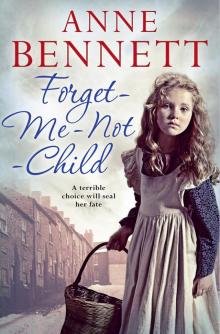 Forget-Me-Not Child
Forget-Me-Not Child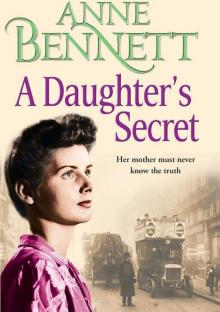 A Daughter's Secret
A Daughter's Secret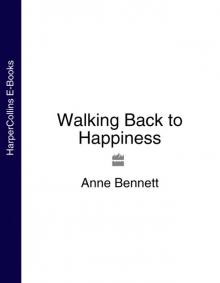 Walking Back to Happiness
Walking Back to Happiness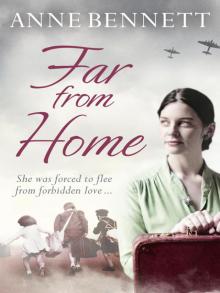 Far From Home
Far From Home Till the Sun Shines Through
Till the Sun Shines Through